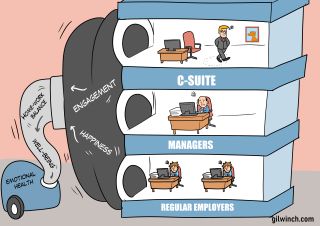From bad to worse: The statistics regarding work-related stress and our emotional health at work have been getting progressively worse over the past 30 years. A recent global survey demonstrates just how bad things currently are:
- 71 percent of employees say work negatively impacts their home life.
- 64 percent of employees say work negatively impacts their well-being.
- 62 percent of employees say work negatively impacts their relationships.
The truth of the matter is that in the modern-day workplace, a majority of people trying to provide for themselves and their loved ones find that their paycheck comes at the price of a hefty emotional toll. We have less patience for our loved ones at home, we are more irritable with our friends, less in touch. We feel run down, lethargic, less happy, and more on edge. That such a majority of employees report feeling that way demonstrates that we are well aware of the detrimental effects of our workplaces on our emotional well-being. In fact, most employees are willing to “provide less” in order to limit the emotional damage they sustain at work.
- 81 percent of employees worldwide would prioritize good mental health over a high-paying job
- 64 percent of employees worldwide admit they would take a pay cut for a job that better supports their mental wellness.
Many employees believe that their manager has a significant impact on their workplace emotional health. 35 percent of employees say their manager fails to recognize the impact they have on their team’s mental well-being and a whopping 68 percent of employees would like their managers to do more to support their mental health. This raises a few questions; does my manager have an easier time emotionally than me? Is it worth my time and effort to attempt to get promoted in order to enjoy better emotional health and well-being at work (as well as improved compensation)?
In other words, does climbing the ladder of success alleviate work-related stress?
I’m sorry to report that, sadly, it doesn’t. It might even make things worse.
- 57 percent of managers wish someone had warned them not to take their current job.
- 46 percent of managers say it’s likely they’ll quit their job within the next 12 months because they’re experiencing too much work-related stress.
- And if you think that a larger paycheck makes it easier for managers to cope emotionally with their own work-related stress and anxiety, it absolutely doesn’t. 70 percent of managers state that they would happily take a pay cut right now for a job that better supports their mental wellness.
What if you climb the ladder of success right to the top? Will that help? Nope:
- 35 percent of C-level leaders are “often” or “always” stressed about work.
- 40 percent of C-level leaders say they will likely quit in the next 12 months due to work-related stress. It seems that senior management’s emotional unhappiness is such that despite being well compensated, close to half state that they can’t “take it” for much longer. Work-related stress and anxiety have reached epidemic levels throughout our workplaces from the rank and file up to senior management, and we are all paying a huge emotional price. It’s worth noting that corporations, states, and countries also pay a huge financial price as well which is extracted in many forms – lowered productivity, heightened employee absenteeism, and heightened employee turnover rates, to mention just a few.

Source: Image by Gil Winch
Changing Corporate Culture: The great news for corporate leaders is that they can actually increase their company’s revenue, their own popularity, and their employee’s emotional health and well-being by doing one thing: Adopting a corporate culture of caring and modeling it top-down by treating everyone kindly and with respect (even the harshest of business decisions could and should be delivered kindly and with respect). But what can lower-level managers do? Every manager has the power to introduce a culture of caring to the people who report to them, and if enough managers do this at all levels, it will transform the culture of the organization.
